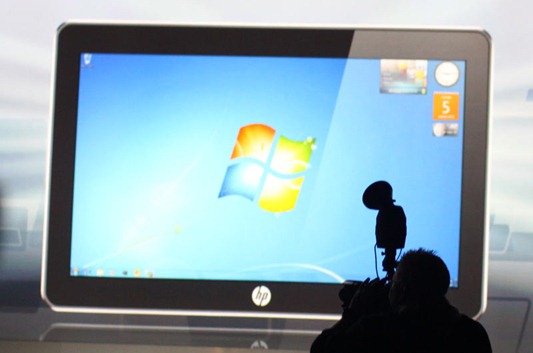Does Microsoft need a Windows 7 slate?
 Microsoft needs an answer to Apple's iPad and that should be some sort of Windows-based consumer tablet.
Microsoft needs an answer to Apple's iPad and that should be some sort of Windows-based consumer tablet. At least that is the position that analysis firm Forrester takes in a new report, which argues that tablets are "the next important computing form."
"To keep its products front and center, Microsoft needs a partner to produce a successful Windows tablet that competes with the Apple iPad," analysts JP Gownder and Sarah Rotman Epps said in a report released on Thursday. "At stake is nothing less than the future of the operating system."
Microsoft CEO Steve Ballmer showed off a Windows 7-based tablet prototype from Hewlett-Packard at the Consumer Electronics Show in January. HP produced several follow-up videos on the Slate, however that product's future has been thrown into severe doubt with HP's announced plans to buy Palm and use WebOS in a variety of devices.
The Forrester analysts argue that the strong early sales of the iPad show a market for a device that can play music and video, browse the Web and display e-books.
"After desktops, laptops, and Netbooks, tablets represent the next wave of mass-market consumer computing devices," the analysts said.
Of course, working with partners on a Windows 7-based device is not the only option for Redmond. It could wait until Windows Phone 7 is a little more fully baked and try to convince partners to use that as the basis for a tablet. That would make it less compatible with existing software, but could have advantages in power consumption, boot-up time and ease of use.
Microsoft could also build its own device from start to finish, using Windows 7, Windows Phone 7, or potentially some other software. That could allow for a more tightly integrated experience but runs the risk of further alienating partners. The company's recent decision to kill the Courier project suggests that Microsoft may have considered and rejected this option.
It's hard to argue with Forrester's basic premise though--that Microsoft needs an answer to the iPad and fast. Its experience trying to play catch-up in the phone and music player arenas shows just how hard it is these days to come from behind.
What's even more unfortunate for the crew in Redmond is the company had a decade head-start in tablets, but finds itself on the outside looking in as the market begins to take off.
And, as Forrester points out, the threat raised by the iPad isn't limited to just tablets, or coming just from Apple.
"Windows can't afford to cede ground on tablets--and not just out of fear that Apple is defining the next generation of computing device," the Forrester researchers said in their report. "Google, too, has its hungry eyes trained on Microsoft's plate and is pushing its Chrome OS as a consumer- and wallet-friendly solution for Netbooks."




 5/28/2010 01:25:00 AM
5/28/2010 01:25:00 AM
 kenmouse
, Posted in
kenmouse
, Posted in
0 Response to "Does Microsoft need a Windows 7 slate?"
Post a Comment
Leave Your Thoughts & We Will Discuss Together